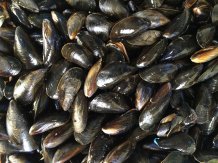
Climate change has different impacts on male and female marine animals, with implications for marine life and seafood production.
Climate change scientists should think more about sex
Urgent need to check how males and females respond differently to ocean acidification.
Climate change can have a different impact on male and female fish, shellfish and other marine animals, with widespread implications for the future of marine life and the production of seafood.
But a paper published today in the Royal Society journal Biology Letters has found that very little research into how males and females respond differently to climate change has been carried out. This is despite recent research on ocean acidification published by lead author Dr Robert Ellis showing that male and female shellfish respond differently to stress.
Dr Ellis says the impact on different sexes should be properly assessed in all aquatic animals to accurately predict how populations will respond to climate change. Any effect on spawning, settlement or survival could have a major impact on sustainable supplies of fish and shellfish.
The latest research by the University of Exeter in collaboration with Plymouth Marine Laboratory reveals that less than 4% of climate-change studies have tested the impact of ocean acidification on males and females separately.
Over the past decade, research into the impacts of rising CO2 on fish and shellfish species has increased dramatically, helping scientists accurately predict the threat climate change poses ecosystems worldwide. Worrying changes in behaviour, survival, growth, reproduction and health have been found in many species.
Co-author of the study Professor Rod Wilson, a climate change marine biologist based at the University Exeter, said in light of this research separate environmental management strategies may be required.
“For marine animal populations to thrive and support sustainable fisheries, the males and females of each species need to reach sexual maturity, and deliver their eggs and sperm in the right place and at the right time. However, the needs of the two sexes during their development are often quite different. Environmental management can potentially devise separate strategies to target key phases in the lifecycle of males and females, respectively, with the aim of minimising the influence of climate change on their development and ultimately the success of the species.”
CO2 levels are projected to be 2.5 times higher in the oceans by the end of this century, which is causing the ocean to acidify at a rate unprecedented for 300 million years.
“Understanding climate change impacts is vital to help protect marine ecosystem services that humans rely on so heavily such as fisheries, aquaculture and tourism” said Dr Rob Ellis, an ecological physiologist also based at the University of Exeter. “Our understanding of these threats has improved significantly over the past decade, but this is still a very new and rapidly evolving field. Many important questions still remain, and sex-based differences will be a key issue with the potential to influence our strategies to mitigate against climate change”.
Co-author of the study Dr Ana Queirós, a climate change and seabed ecologist at Plymouth Marine Laboratory, said ignoring potential differences in how males and females respond has implications for managing the future ocean:
“At present, out best informed guess of how climate change and ocean acidification will impact species in the wild, marine diversity, and our uses of them for instance through fisheries and aquaculture, depends on numerical model forecasts. These models are only as good as the data we use to build them. We now have sufficient evidence to believe that in some species, males and females will respond very differently to climate change and associated stressors because of natural physiological processes. We do not know if all species will show these differences. It is therefore time we started taking this question more seriously into consideration in the design of our experiments and of our models. Without this, we may severely underestimate the impact of climate change on wildlife and vital sectors of the ocean based economy."
This research forms part of a wider scientific response to a recent House of Commons select committee enquiry on ocean acidification submitted by the University of Exeter, led by Dr Ceri Lewis.
Dr Lewis said: “Our research is vital for understanding the challenges that climate change poses for marine ecosystems. In light of recent political events globally, it has never been more important to ensure society is accurately educated and informed about the very real threat that is climate change. This enquiry and the evidence it presents is just a single crucial step in this process”.
Date: 31 January 2017
